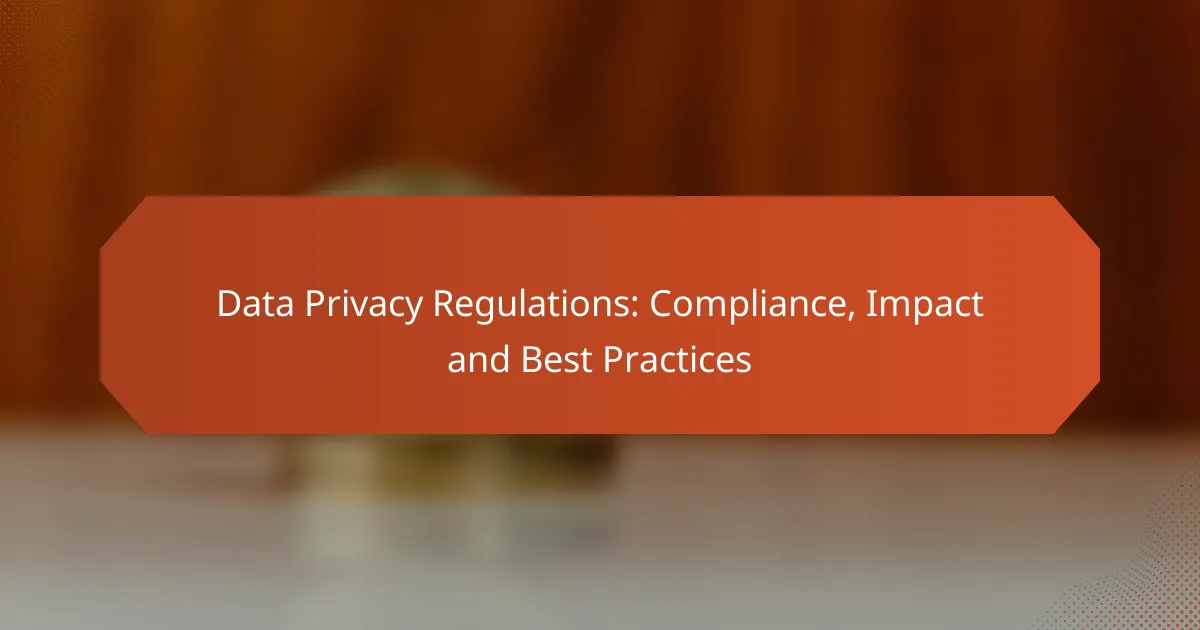Data privacy regulations are essential frameworks that dictate how personal information is collected, used, and shared, aiming to safeguard consumer rights and promote responsible data handling by organizations. Compliance with these regulations requires a thorough understanding of legal requirements and the implementation of effective measures, such as data audits and employee training. Failing to adhere to these laws can result in significant financial penalties, reputational damage, and legal challenges, making it vital for businesses to prioritize compliance and protect their interests.
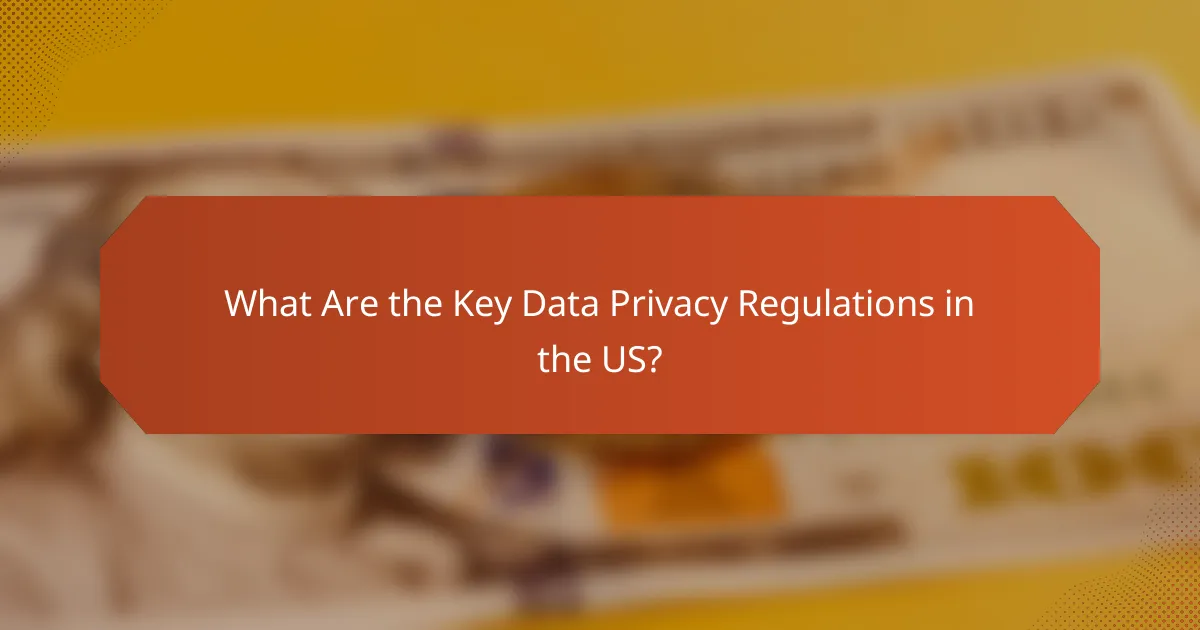
What Are the Key Data Privacy Regulations in the US?
The key data privacy regulations in the US include laws that govern how personal information is collected, used, and shared. These regulations aim to protect consumer rights and ensure organizations handle data responsibly.
California Consumer Privacy Act (CCPA)
The California Consumer Privacy Act (CCPA) grants California residents specific rights regarding their personal data. Under this law, consumers can request information about the data collected about them, opt out of the sale of their data, and request deletion of their information.
Businesses must comply with CCPA if they meet certain thresholds, such as having annual gross revenues over $25 million or processing the personal data of over 50,000 consumers. Non-compliance can result in significant fines.
Health Insurance Portability and Accountability Act (HIPAA)
The Health Insurance Portability and Accountability Act (HIPAA) establishes standards for protecting sensitive patient health information. Covered entities, like healthcare providers and insurers, must implement safeguards to ensure the confidentiality and integrity of health data.
HIPAA allows patients to access their medical records and request corrections. Violations can lead to hefty penalties, making compliance critical for healthcare organizations.
Children’s Online Privacy Protection Act (COPPA)
The Children’s Online Privacy Protection Act (COPPA) protects the privacy of children under 13 by requiring parental consent before collecting personal information from them. Websites and online services directed at children must provide clear privacy policies and ensure data security.
Organizations that fail to comply with COPPA may face fines and legal action. It’s essential for businesses targeting children to understand and implement these requirements effectively.
General Data Protection Regulation (GDPR) Overview
While the General Data Protection Regulation (GDPR) is a European Union regulation, it impacts US companies that process the personal data of EU residents. GDPR emphasizes data protection and privacy, granting individuals rights such as data access, rectification, and erasure.
US businesses must ensure compliance when dealing with EU citizens’ data, which may involve appointing a data protection officer and conducting impact assessments. Non-compliance can result in substantial fines, making it vital for organizations to understand these obligations.
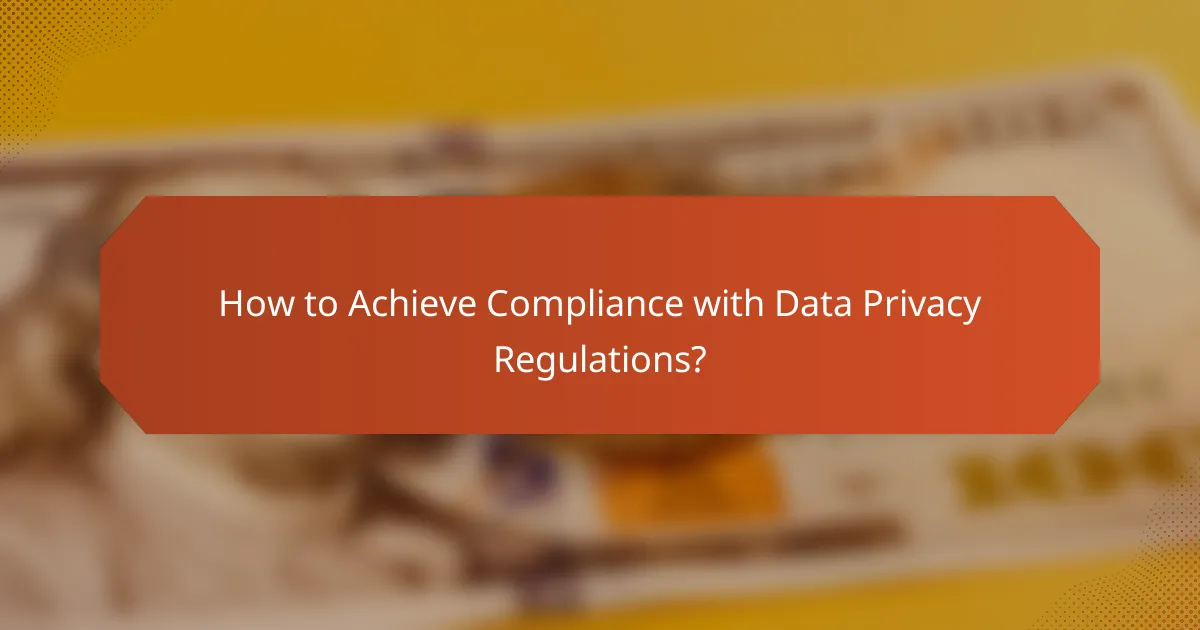
How to Achieve Compliance with Data Privacy Regulations?
Achieving compliance with data privacy regulations involves understanding the specific requirements of applicable laws and implementing necessary measures to meet them. Key steps include conducting data audits, establishing privacy policies, and training employees on compliance practices.
Conducting Data Audits
Data audits are essential for identifying what personal data your organization collects, processes, and stores. This process should include mapping data flows, assessing data storage locations, and evaluating data usage to ensure compliance with regulations like GDPR or CCPA.
Regular audits help uncover vulnerabilities and ensure that data handling practices align with legal requirements. Aim to conduct audits at least annually or whenever significant changes occur in data processing activities.
Implementing Privacy Policies
Establishing clear privacy policies is crucial for compliance. These policies should outline how personal data is collected, used, shared, and protected, and they must be easily accessible to users. Ensure that your policies reflect current regulations and are updated regularly.
Consider including sections on user rights, data retention, and breach notification procedures. Transparency fosters trust and can mitigate the risk of regulatory penalties.
Training Employees on Compliance
Training employees on data privacy compliance is vital for fostering a culture of accountability. Regular training sessions should cover the importance of data protection, specific regulatory requirements, and the organization’s privacy policies.
Utilize practical examples and scenarios to illustrate potential risks and appropriate responses. Regular refresher courses can help keep compliance top of mind and reduce the likelihood of breaches due to human error.
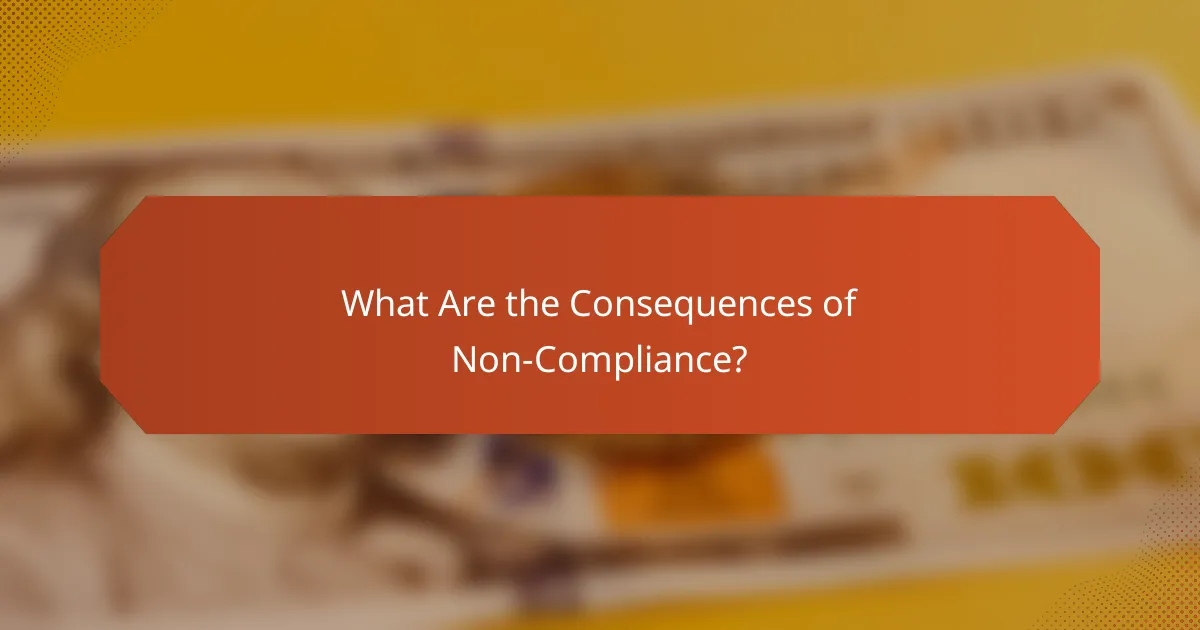
What Are the Consequences of Non-Compliance?
Non-compliance with data privacy regulations can lead to severe repercussions for organizations, including financial losses, damage to reputation, and potential legal actions. Understanding these consequences is crucial for businesses to ensure they adhere to the relevant laws and protect their interests.
Financial Penalties
Organizations that fail to comply with data privacy regulations may face substantial financial penalties. For instance, fines can range from thousands to millions of dollars, depending on the severity of the violation and the specific regulations involved, such as GDPR or CCPA.
To avoid these penalties, companies should regularly audit their data practices and ensure compliance with applicable laws. Investing in compliance training and robust data management systems can significantly reduce the risk of incurring fines.
Reputational Damage
Reputational damage is a significant consequence of non-compliance that can have long-lasting effects on a business. Customers and clients may lose trust in a company that mishandles their data, leading to decreased sales and customer loyalty.
To mitigate reputational risks, organizations should prioritize transparency in their data handling practices and communicate effectively with stakeholders about their compliance efforts. Building a strong data privacy culture within the organization can also help enhance public perception.
Legal Actions
Non-compliance can result in legal actions from both regulatory bodies and affected individuals. Companies may face lawsuits from customers whose data has been compromised, leading to costly legal battles and settlements.
To minimize the likelihood of legal issues, businesses should implement comprehensive data protection policies and ensure they are regularly updated to reflect changes in regulations. Engaging legal experts to review compliance strategies can also be beneficial in navigating complex legal landscapes.
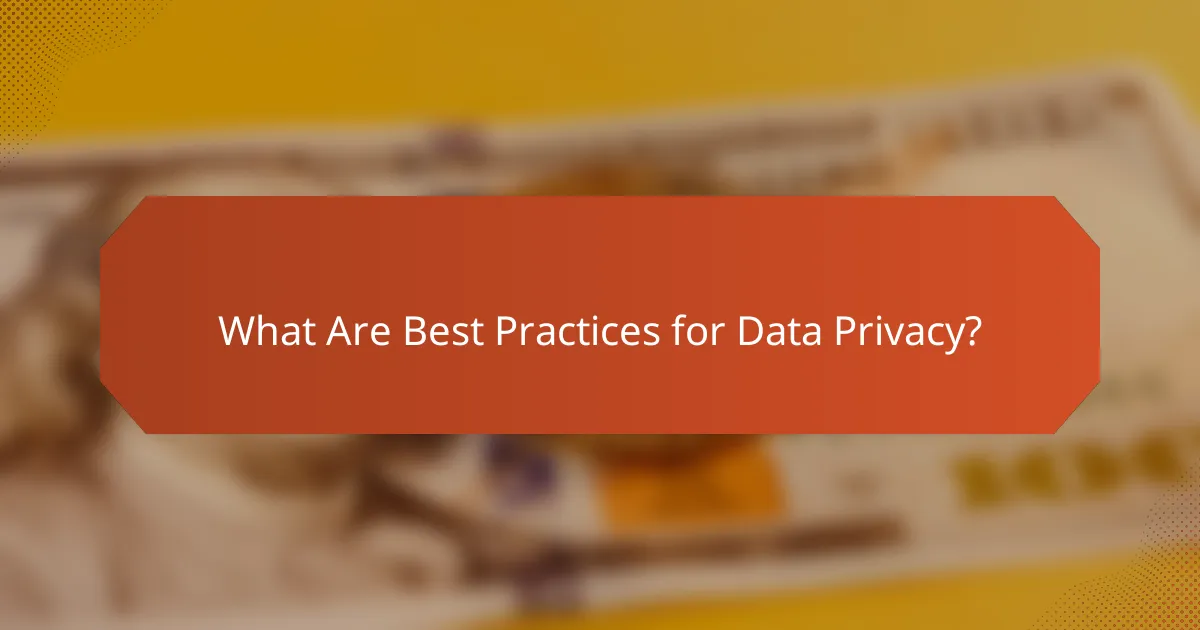
What Are Best Practices for Data Privacy?
Best practices for data privacy involve implementing strategies that protect personal information while ensuring compliance with regulations. These practices help organizations minimize risks and enhance trust with customers.
Data Minimization Techniques
Data minimization techniques focus on collecting only the necessary information required for a specific purpose. This reduces the risk of data breaches and simplifies compliance with regulations like GDPR, which emphasizes limiting data collection.
Organizations should regularly assess their data needs and eliminate any unnecessary data. For instance, if a business only requires an email address for communication, it should avoid collecting additional personal details such as phone numbers or addresses.
Regular Compliance Reviews
Conducting regular compliance reviews is essential for ensuring that data privacy practices align with current regulations and standards. These reviews help identify gaps in policies and procedures that could expose organizations to legal risks.
Establish a schedule for compliance audits, ideally quarterly or bi-annually, to evaluate data handling practices. During these reviews, assess data storage, sharing practices, and employee training to ensure adherence to privacy laws.
Utilizing Encryption Methods
Utilizing encryption methods is a critical practice for protecting sensitive data from unauthorized access. Encryption transforms data into a secure format that can only be read by those with the correct decryption key, thus safeguarding information during storage and transmission.
Implement encryption protocols for both data at rest and data in transit. For example, using TLS (Transport Layer Security) for online transactions and AES (Advanced Encryption Standard) for stored data can significantly enhance security. Regularly update encryption methods to keep pace with evolving threats.
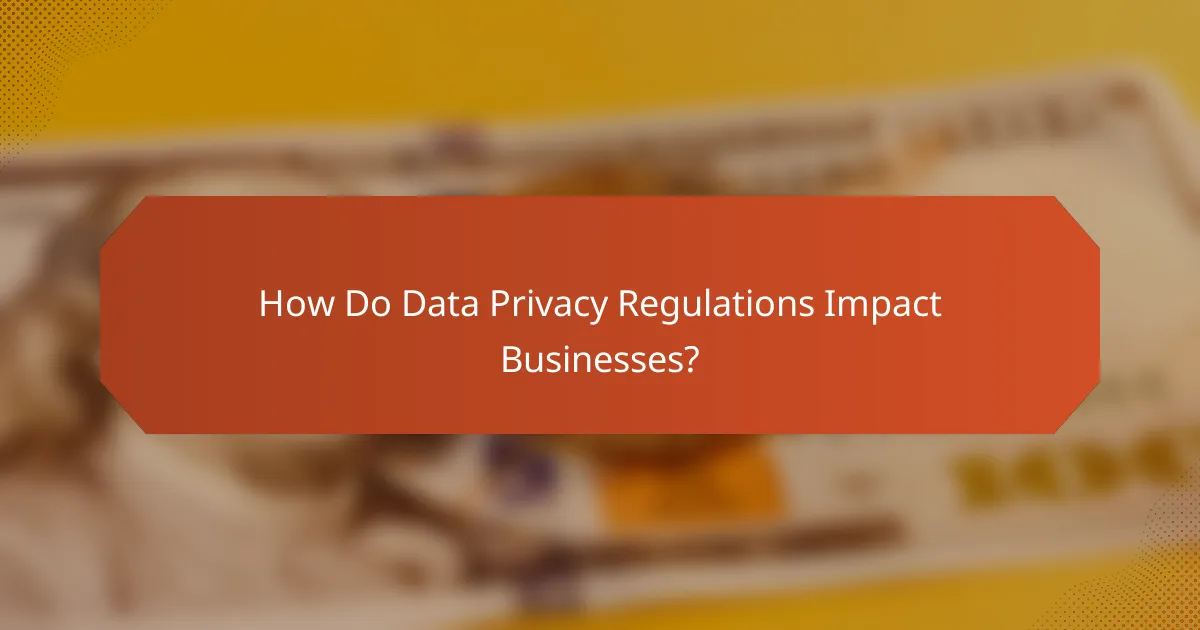
How Do Data Privacy Regulations Impact Businesses?
Data privacy regulations significantly affect businesses by imposing strict guidelines on how they collect, store, and manage personal information. Compliance with these regulations is essential to avoid hefty fines and maintain a positive reputation.
Operational Changes Required
Businesses must implement operational changes to comply with data privacy regulations. This includes updating data collection processes, enhancing security measures, and establishing clear protocols for data access and sharing. For example, companies may need to appoint a Data Protection Officer (DPO) to oversee compliance efforts.
Additionally, organizations should conduct regular audits to assess their data handling practices and ensure they align with legal requirements. Training staff on data privacy principles is also crucial to foster a culture of compliance.
Cost Implications for Compliance
Compliance with data privacy regulations often incurs significant costs. Businesses may need to invest in new technology, such as encryption tools and secure storage solutions, which can range from hundreds to thousands of dollars depending on the scale of operations. Hiring legal experts or consultants to navigate complex regulations can further increase expenses.
Moreover, ongoing costs related to employee training and compliance audits should be factored into the budget. Companies should prepare for both initial setup costs and recurring expenses to maintain compliance over time.
Impact on Customer Trust
Adhering to data privacy regulations can enhance customer trust, as consumers are increasingly concerned about how their personal information is handled. When businesses demonstrate a commitment to protecting customer data, they are more likely to build strong, lasting relationships with their clients.
Conversely, non-compliance can lead to data breaches and loss of customer confidence. Companies should communicate their data protection efforts transparently, reassuring customers that their information is safe and secure. This proactive approach can differentiate a business in a competitive market.

What Tools Can Help with Data Privacy Compliance?
Various tools can assist organizations in achieving data privacy compliance by automating processes, ensuring adherence to regulations, and managing risks. These solutions often streamline data management, facilitate audits, and provide reporting capabilities to maintain compliance with standards such as GDPR and CCPA.
OneTrust for Compliance Management
OneTrust is a comprehensive platform designed to help organizations manage their data privacy compliance efforts effectively. It offers features such as data mapping, risk assessments, and incident response management, making it easier to navigate complex regulations.
With OneTrust, businesses can automate the creation of privacy notices and consent management processes, ensuring that they meet legal requirements while enhancing user trust. The platform also provides robust reporting tools to track compliance status and identify areas for improvement.
Organizations should consider integrating OneTrust into their compliance strategy, especially if they handle large volumes of personal data. However, it is essential to evaluate the costs and ensure that the tool aligns with specific compliance needs and organizational size. Regular training and updates are also crucial to maximize its effectiveness.
